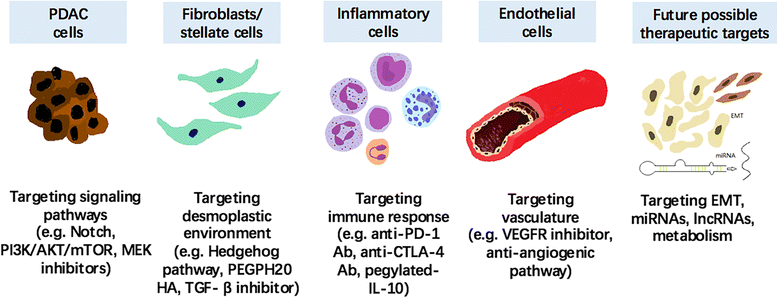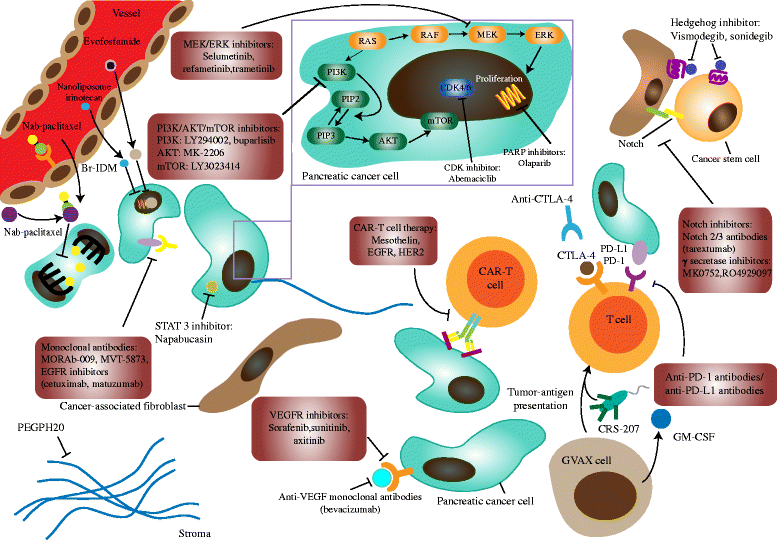Novel agents for pancreatic ductal adenocarcinoma: emerging therapeutics and future directions
- PMID: 29386069
- PMCID: PMC5793409
- DOI: 10.1186/s13045-017-0551-7
Novel agents for pancreatic ductal adenocarcinoma: emerging therapeutics and future directions
Abstract
A poor prognosis of pancreatic ductal adenocarcinoma (PDAC) associated with chemoresistance has not changed for the past three decades. A multidisciplinary diagnosis followed by surgery and chemo(radiation)therapy is the main treatment approach. However, gemcitabine- and 5-fluorouracil-based therapies did not present satisfying outcomes. Novel regimens targeting pancreatic cancer cells, the tumor microenvironment, and immunosuppression are emerging. Biomarkers concerning the treatment outcome and patient selection are being discovered in preclinical or clinical studies. Combination therapies of classic chemotherapeutic drugs and novel agents or novel therapeutic combinations might bring hope to the dismal prognosis for PDAC patients.
Keywords: Biomarkers; Combination therapies; Novel regimens; Pancreatic ductal adenocarcinoma.
Conflict of interest statement
Ethics approval and consent to participate
Not applicable.
Consent for publication
Not applicable.
Competing interests
The authors declare that they have no competing interests.
Publisher’s Note
Springer Nature remains neutral with regard to jurisdictional claims in published maps and institutional affiliations.
Figures


References
-
- Jones S, Zhang X, Parsons DW, Lin JC, Leary RJ, Angenendt P, Mankoo P, Carter H, Kamiyama H, Jimeno A, Hong SM, Fu B, Lin MT, Calhoun ES, Kamiyama M, Walter K, Nikolskaya T, Nikolsky Y, Hartigan J, Smith DR, Hidalgo M, Leach SD, Klein AP, Jaffee EM, Goggins M, Maitra A, Iacobuzio-Donahue C, Eshleman JR, Kern SE, Hruban RH, et al. Core signaling pathways in human pancreatic cancers revealed by global genomic analyses. Science. 2008;321(5897):1801–1806. doi: 10.1126/science.1164368. - DOI - PMC - PubMed
-
- Bailey P, Chang DK, Nones K, Johns AL, Patch AM, Gingras MC, Miller DK, Christ AN, Bruxner TJ, Quinn MC, Nourse C, Murtaugh LC, Harliwong I, Idrisoglu S, Manning S, Nourbakhsh E, Wani S, Fink L, Holmes O, Chin V, Anderson MJ, Kazakoff S, Leonard C, Newell F, Waddell N, Wood S, Xu Q, Wilson PJ, Cloonan N, Kassahn KS, et al. Genomic analyses identify molecular subtypes of pancreatic cancer. Nature. 2016;531(7592):47–52. doi: 10.1038/nature16965. - DOI - PubMed
-
- Notta F, Chan-Seng-Yue M, Lemire M, Li Y, Wilson GW, Connor AA, Denroche RE, Liang SB, Brown AM, Kim JC, Wang T, Simpson JT, Beck T, Borgida A, Buchner N, Chadwick D, Hafezi-Bakhtiari S, Dick JE, Heisler L, Hollingsworth MA, Ibrahimov E, Jang GH, Johns J, Jorgensen LG, Law C, Ludkovski O, Lungu I, Ng K, Pasternack D, Petersen GM, et al. A renewed model of pancreatic cancer evolution based on genomic rearrangement patterns. Nature. 2016;538(7625):378–382. doi: 10.1038/nature19823. - DOI - PMC - PubMed
Publication types
MeSH terms
Substances
LinkOut - more resources
Full Text Sources
Other Literature Sources
Medical
Miscellaneous

